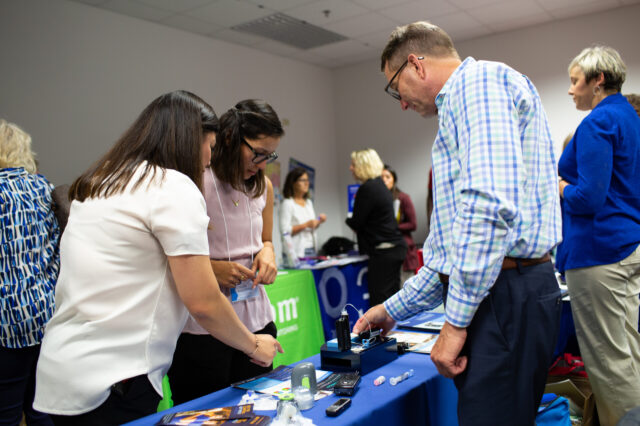UF Health launches effort to improve access to care for Type 1 diabetes patients

A Type 1 diabetes specialist might as well be half a world away for many underserved people living with the disease.
These patients often live in rural areas where endocrinologists don’t practice. Some might lack transportation to travel to a distant physician or can’t get a day off work. Others living near the poverty line might not be able to afford a doctor or are simply intimidated by visiting a large medical center even if they live in an urban area.
As a result, the local family medical practice is their bulwark against poor health.
UF Health researchers Friday launched an effort to improve access to care for underserved children and adults living with Type 1 diabetes, an autoimmune disease that results in the destruction of insulin-producing cells in the pancreas. Using a $1.6 million pilot grant from The Leona M. & Harry B. Helmsley Charitable Trust, the program aims to help primary care physicians in Florida and California attain a greater level of expertise on a complicated disease by addressing the racial, socioeconomic and geographic disparities that affect health outcomes for these patients.
Researchers said the program is being implemented in Florida and California because those states have a large and diverse group of underserved patients.
At the kickoff event held at the UF College of Public Health and Health Professions, UF Health’s project leaders provided orientation and training to medical directors and primary care physicians representing 11 medical centers or other health facilities from Miami to Pensacola who, through dozens of clinics, treat more than 1,000 patients with Type 1 diabetes.
Among the participants are the UF Student Health Care Center, UF Health Family Medicine – Eastside and UF Health Family Medicine – Old Town.
The American Diabetes Association recommends that patients with Type 1 diabetes visit an endocrinologist four times a year to optimize their treatment. That just isn’t possible for many people.
“The only place they’re going for care is their primary care doctors,” said Michael J. Haller, M.D., a professor and chief of pediatric endocrinology in the UF College of Medicine and a member of the UF Diabetes Institute. “And so, to improve their ability to manage the disease, we have to improve the knowledge base of those primary care providers. Those primary care doctors are eager to learn but just haven’t been given the opportunity in the past.”
The 18-month pilot project is headed by Haller and Ashby Walker, Ph.D., the director of health equity initiatives at the UF Diabetes Institute, in addition to collaborators at Stanford University.
“We have been able to demonstrate in our research that, even when a visit to a specialist is covered by Medicaid, for example, that does not mean a person will actually use those services,” said Walker, an assistant professor in the UF College of Public Health and Health Professions’ department of health services research, management and policy.
The researchers will work with primary care physicians and patients who aren’t using an endocrinologist to determine their needs and the health care barriers they face. Health care providers who treat Type 1 diabetes patients will receive virtual training and tele-education each week from diabetes “hubs” at UF and Stanford. The physicians also will get real-time help with challenging medical decision-making issues from diabetes professionals as well as a diabetes care liaison assigned to their clinic and opportunities to enroll their patients in research projects and initiatives at their hubs.
The effort uses the Extension for Community Health Care Outcomes model, also known as Project ECHO®, which has been adapted for a range of diseases, from hepatitis C to chronic pain.
Patients who are unable to see a specialty provider are at higher risk of losing control of their diabetes. Often, they don’t have access to devices crucial to Type 1 diabetes management, such as insulin pumps and continuous blood glucose monitoring.
They might be getting their insulin from the family doctor with little, if any, specialized care.
Jason Konopack, M.D., M.P.H., the medical director of UF Health Family Medicine – Old Town, a rural community an hour’s drive west of Gainesville in Dixie County, said it can be exceedingly difficult for some of his patients to make the trip to UF Health Shands Hospital for a specialist visit.
“What the program is trying to do is to equip us to provide the best possible care in a way that means something to these patients,” he said. “They all have good relationships with their primary care doctors, when they have access to primary care. And they’ll deal with that part of the system. They feel comfortable with it. They feel protected by it.”
Walker said the hope is that the program, once established, will eventually be expanded to serve even more patients.
“This empowers primary care providers to better serve their patients,” she said.
Primary care providers can contact researchers at hallemj@peds.ufl.edu or afwalker@ufl.edu if they are interested in participating in the Type 1 diabetes ECHO program.
About the author
